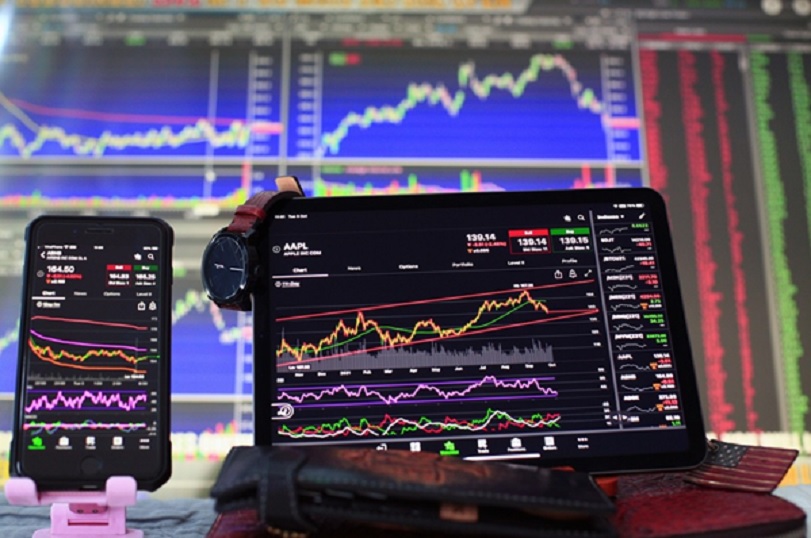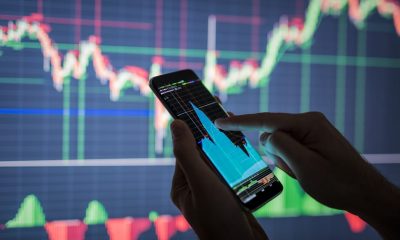Economy
Unlocking Profits: Harnessing the Power of Trading Apps

In the fast-evolving world of finance, trading apps have become a crucial tool for investors seeking to unlock profits and optimize their trading strategies. These digital platforms, such as forex trading apps and stock trading apps, offer a plethora of features designed to enhance trading efficiency and accessibility. In this article, we explore how these applications are revolutionizing the trading landscape, allowing traders of all levels to harness their power effectively.
The Rise of Trading Apps
Trading apps have transformed the way individuals engage with financial markets. No longer confined to the realm of professional brokers and financial analysts, these apps provide real-time market data, advanced analytical tools, and direct trading capabilities right at the user’s fingertips. Whether it’s for trading stocks, forex, or other financial instruments, these apps democratize access to global markets, making it possible for anyone with an internet connection to participate in trading. This accessibility has opened up opportunities for a new demographic of traders, breaking down the traditional barriers that once made the financial markets seem inaccessible and complex. Now, individuals can manage their investments, monitor market trends, and make informed decisions with ease and efficiency. The intuitive design of these apps caters to both novice and experienced traders, offering customized interfaces that can be tailored to each user’s trading style and preferences. This shift not only empowers more people to enter the markets but also enriches the trading landscape with greater diversity in participation.
Key Features of Trading Apps
One of the standout features of modern trading apps is their ability to provide comprehensive market analysis tools. These include interactive charts, live price feeds, historical data analysis, and predictive modeling tools. For instance, a forex trading app not only allows users to trade currencies but also offers them tools to analyze forex market trends, set stop-loss orders, and track performance in real-time.
Another crucial feature is the seamless integration of educational resources. Many apps come equipped with tutorials, webinars, and articles that help users understand the nuances of market movements and trading strategies. This educational aspect is vital for new traders, empowering them with knowledge to make informed decisions.
Enhancing Trading Efficiency
The convenience of trading apps significantly enhances trading efficiency. With the ability to execute trades anytime and from anywhere, these apps ensure that users never miss out on a potentially lucrative trade. This is particularly important in highly volatile markets, such as forex, where currency values can fluctuate dramatically within minutes.
Recent market activity illustrates the volatility that traders must navigate. For example, the NASD OTC’s recent 2.36% decline on return from a 3-day break underscores the dynamic nature of financial markets. Traders equipped with real-time data and analytical tools from trading apps were better positioned to respond to these changes effectively.
Reducing Costs and Increasing Accessibility
Trading apps also play a pivotal role in reducing the costs associated with trading. By eliminating the need for physical brokers and reducing transaction fees, these apps make trading more cost-effective. Furthermore, the user-friendly design of these apps lowers the entry barrier for amateur traders, allowing them a greater chance to participate in trading activities traditionally dominated by more experienced professionals.
Security Aspects
Security remains a top priority for trading app developers. With significant sums of money being transacted daily, these apps incorporate advanced security measures like two-factor authentication, encryption, and continuous security audits to protect user data and funds. The confidence that these security measures inspire is crucial for maintaining user trust and facilitating smooth trading experiences. Additionally, many apps are now implementing biometric security features such as fingerprint scanning and facial recognition to provide an extra layer of security. These technologies ensure that only the authorized user can access their account, significantly reducing the risk of unauthorized access. Moreover, developers regularly update their software to patch any vulnerabilities and to defend against new types of cyber threats. These proactive security practices are essential not only for safeguarding assets but also for ensuring that the trading platform remains reliable and trustworthy, thus enhancing user engagement and retention.
The Future of Trading Apps
As technology advances, trading apps continue to evolve. The integration of artificial intelligence and machine learning into these apps is set to redefine trading strategies. These technologies can provide personalized trading insights, automate trading actions, and analyze vast amounts of data to predict market trends more accurately.
Conclusion
Trading apps are more than just tools; they are gateways to financial empowerment. By offering real-time access to global markets, educational resources, and essential trading tools, they provide an unprecedented level of support to traders. Whether you are using a forex trading app to trade currencies or monitoring stock fluctuations after significant market events, these apps are integral to modern trading strategies. As the digital landscape expands, the potential for these tools to enhance trading outcomes continues to grow. With the right approach and continuous learning, traders can effectively harness the power of trading apps to unlock significant profits and achieve trading success.
Economy
Seven Price Gainers Boost NASD OTC Bourse by 2.19%

By Adedapo Adesanya
Seven price gainers flipped recent declines at the NASD Over-the-Counter (OTC) Securities Exchange, raising the alternative stock market by 2.19 per cent on Friday.
According to data, the market capitalisation added N51.24 billion to end N2.389 trillion compared with the previous day’s N2.338 trillion, while the NASD Unlisted Security Index (NSI) climbed 85.65 points to close at 3,994.32 points, in contrast to the 3,908.67 points it ended a day earlier.
Business Post reports that the advancers were led by MRS Oil Plc, which improved its value by N13.00 to N200.00 per share from N187.00 per share, FrieslandCampina Wamco Nigeria Plc gained N7.40 to settle at N91.55 per unit versus the previous day’s N84.15 per unit, Central Securities Clearing System (CSCS) Plc appreciated by N6.08 to N71.00 per share from N64.92 per share, Afriland Properties Plc added 66 Kobo to finish at N17.17 per unit versus N16.51 per unit, IPWA Plc rose 37 Kobo to N4.15 per share from N3.78 per share, First Trust Mortgage Bank Plc grew by 11 Kobo to N1.20 per unit from N1.09 per unit, and Food Concepts Plc went up by 10obo to N3.70 per share from N3.60 per share.
On the flip side, there were two price losers led by Geo-Fluids Plc, which depreciated by 28 Kobo to N3.32 per unit from N3.60 per unit, and Industrial and General Insurance (IGI) Plc dropped 5 Kobo to sell at 45 Kobo per share from 50 Kobo per share.
Yesterday, the volume of trades went down by 92.0 per cent to 3.7 million units from 45.8 million units, the value of transactions fell by 59.4 per cent to N84.5 million from N208.2 million, while the number of deals went up by 7.7 per cent to 42 deals from 39 deals.
CSCS Plc remained the most traded stock by value (year-to-date) with 32.6 million units exchanged for N1.9 billion, trailed by Geo-Fluids Plc with 119.6 million units valued at N470.3 million, and Resourcery Plc with 1.05 billion units traded at N408.6 million.
Resourcery Plc closed the day as the most traded stock by volume (year-to-date) with 1.05 billion units sold for N408.7 million, followed by Geo-Fluids Plc with 119.6 million units worth N470.3 million, and CSCS Plc with 32.6 million units worth N1.9 billion.
Economy
FX Demand Worries Weaken Naira to N1,346/$1 at Official Market

By Adedapo Adesanya
The Naira weakened further against the United States Dollar in the Nigerian Autonomous Foreign Exchange Market (NAFEX) on Friday, February 20, by N4.97 or 0.37 per cent to N1,346.32/$1 from the N1,341.35/$1 it was transacted on Thursday.
Heightened FX demand tilted the market toward the downside yesterday, exerting upward pressure on rates despite efforts by the Central Bank of Nigeria (CBN) to stabilise the foreign exchange market.
Also in the official market, the domestic currency depreciated against the Pound Sterling during the session by N9.39 to sell for N1,815.25/£1 versus the previous day’s N1,805.86/£1, and lost N7.33 against the Euro to close at N1,584.62/€1 compared with the preceding session’s N1,577.29/€1.
The story was not different for the Nigerian Naira at the GTBank FX desk, where it depleted against the Dollar by N7 on Friday to quote at N1,356/$1 versus the N1,349/$1 it was sold a day earlier, but remained unchanged in the black market at N1,370/$1.
It was observed that risky sentiment among Foreign Portfolio Investors (FPIs) contributed to the FX market, amid fears of hot money flight due to capital gains tax and other factors.
As for the cryptocurrency market, it was mostly green yesterday in reaction to a Supreme Court verdict dismissing a fresh 10 per cent global levy by President Donald Trump.
The apex court on Friday described Mr Trump’s global tariff rollout as illegal. The decision did not clarify what should happen to tariff revenue already collected, and it doesn’t necessarily spell the end of the trade agenda, with multiple legal and executive avenues still available.
Litecoin (LTC) grew 2.7 per cent to $55.00, Cardano (ADA) appreciated 2.6 per cent to trade at $0.2815, Binance Coin (BNB) expanded by 2.6 per cent to $627.19, Dogecoin (DOGE) recouped 1.3 per cent to quote at $0.1, Ripple (XRP) jumped 0.7 per cent to $1.43, Solana (SOL) improved by 0.5 per cent to $84.15, and Ethereum (ETH) soared 0.1 per cent to $1,962.78.
However, Bitcoin (BTC) lost 0.2 per cent to sell for $67,850.49, while the US Dollar Tether (USDT) and the US Dollar Coin (USDC) traded flat at $1.00 each.
Economy
Fidson, Jaiz Bank, Others Keep NGX in Green Territory

By Dipo Olowookere
A further 0.99 per cent was gained by the Nigerian Exchange (NGX) Limited on Friday after a positive market breadth index supported by 53 price gainers, which outweighed 23 price losers, representing bullish investor sentiment.
During the trading day, the trio of Jaiz Bank, Fidson, and NPF Microfinance Bank chalked up 10.00 per cent each to sell for N11.00, N86.90, and N6.27, respectively, while Deap Capital appreciated by 9.96 per cent to N7.62, and Mutual Benefits increased by 9.94 per cent to N5.42.
Conversely, Secure Electronic Technology shed 10.00 per cent to trade at N1.62, Sovereign Trust Insurance slipped by 9.73 per cent to N2.32, Ellah Lakes declined by 7.91 per cent to N12.80, International Energy Insurance retreated by 5.56 per cent to N3.40, and ABC Transport moderated by 5.26 per cent to N9.00.
Data from Customs Street revealed that the insurance counter was up by 2.52 per cent, the industrial goods sector grew by 2.28 per cent, the banking space expanded by 1.43 per cent, the consumer goods index gained 1.23 per cent, and the energy industry rose by 0.05 per cent.
As a result, the All-Share Index (ASI) went up by 1,916.20 points to 194,989.77 points from 193,073.57 points, and the market capitalisation moved up by N1.230 trillion to N125.164 trillion from Thursday’s N123.934 trillion.
Yesterday, investors traded 820.5 million stocks valued at N28.3 billion in 63,507 deals compared with the 898.5 million stocks worth N38.5 billion executed in 61,953 deals, showing a jump in the number of deals by 2.51 per cent, and a shortfall in the trading volume and value by 8.68 per cent and 26.49 per cent apiece.
Closing the session as the most active equity was Mutual Benefits with 79.0 million units worth N427.1 million, Zenith Bank traded 44.0 million units valued at N3.8 billion, Chams exchanged 43.9 million units for N182.0 million, AIICO Insurance transacted 42.4 million units valued at N179.8 million, and Veritas Kapital sold 36.0 million units worth N90.6 million.
-

 Feature/OPED6 years ago
Feature/OPED6 years agoDavos was Different this year
-
Travel/Tourism10 years ago
Lagos Seals Western Lodge Hotel In Ikorodu
-

 Showbiz3 years ago
Showbiz3 years agoEstranged Lover Releases Videos of Empress Njamah Bathing
-

 Banking8 years ago
Banking8 years agoSort Codes of GTBank Branches in Nigeria
-

 Economy3 years ago
Economy3 years agoSubsidy Removal: CNG at N130 Per Litre Cheaper Than Petrol—IPMAN
-

 Banking3 years ago
Banking3 years agoSort Codes of UBA Branches in Nigeria
-

 Banking3 years ago
Banking3 years agoFirst Bank Announces Planned Downtime
-

 Sports3 years ago
Sports3 years agoHighest Paid Nigerian Footballer – How Much Do Nigerian Footballers Earn















